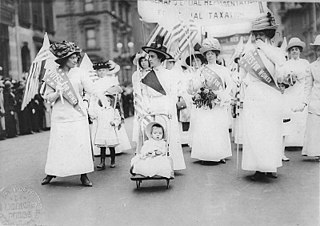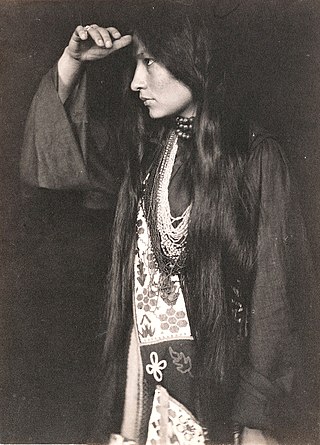
The Nineteenth Amendment to the United States Constitution prohibits the United States and its states from denying the right to vote to citizens of the United States on the basis of sex, in effect recognizing the right of women to vote. The amendment was the culmination of a decades-long movement for women's suffrage in the United States, at both the state and national levels, and was part of the worldwide movement towards women's suffrage and part of the wider women's rights movement. The first women's suffrage amendment was introduced in Congress in 1878. However, a suffrage amendment did not pass the House of Representatives until May 21, 1919, which was quickly followed by the Senate, on June 4, 1919. It was then submitted to the states for ratification, achieving the requisite 36 ratifications to secure adoption, and thereby went into effect, on August 18, 1920. The Nineteenth Amendment's adoption was certified on August 26, 1920.

Frances Ellen Watkins Harper was an American abolitionist, suffragist, poet, temperance activist, teacher, public speaker, and writer. Beginning in 1845, she was one of the first African American women to be published in the United States.

Katha Pollitt is an American poet, essayist and critic. She is the author of four essay collections and two books of poetry. Her writing focuses on political and social issues from a left-leaning perspective, including abortion, racism, welfare reform, feminism, and poverty.
First-wave feminism was a period of feminist activity and thought that occurred during the 19th and early 20th century throughout the Western world. It focused on legal issues, primarily on securing women's right to vote. The term is often used synonymously with the kind of feminism espoused by the liberal women's rights movement with roots in the first wave, with organizations such as the International Alliance of Women and its affiliates. This feminist movement still focuses on equality from a mainly legal perspective.

Dorothy Allison is an American writer from South Carolina whose writing focuses on class struggle, sexual abuse, child abuse, feminism and lesbianism. She is a self-identified lesbian femme. Allison has won a number of awards for her writing, including several Lambda Literary Awards. In 2014, Allison was elected to membership in the Fellowship of Southern Writers.

Women's suffrage, or the right of women to vote, was established in the United States over the course of the late 19th and early 20th centuries, first in various states and localities, then nationally in 1920 with the ratification of the 19th Amendment to the United States Constitution.

Eliza Griswold is a Pulitzer Prize–winning American journalist and poet. Griswold is currently a contributing writer to The New Yorker and a Distinguished Writer in Residence at New York University. She is the author of Amity and Prosperity: One Family and the Fracturing of America, a 2018 New York Times Notable Book and a Times Critics’ Pick, for which she won the Pulitzer Prize for general nonfiction and the Ridenhour Book Prize in 2019. Griswold was a fellow at the New America Foundation from 2008 to 2010 and won a 2010 Rome Prize from the American Academy of Arts and Letters. She is a former Nieman Fellow and a current Berggruen Fellow at Harvard Divinity School, and has been published in The New Yorker, Harper's Magazine, and the New York Times Magazine.

Amy Lynn Webb is an American futurist, author and founder and CEO of the Future Today Institute. She is an adjunct assistant professor at New York University's Stern School of Business, a nonresident senior fellow at Atlantic Council, and was a 2014–15 Visiting Nieman Fellow at Harvard University.

Feminism is aimed at defining, establishing, and defending a state of equal political, economic, cultural, and social rights for women. It has had a massive influence on American politics. Feminism in the United States is often divided chronologically into first-wave, second-wave, third-wave, and fourth-wave feminism.
Susan Ware is an American independent scholar, writer and editor who lives in Cambridge, Massachusetts, and Hopkinton, New Hampshire. The author of eight biographies, two edited collections, and co-editor of a textbook, Ware is a specialist on 20th-century women's political and cultural history, and the history of popular feminism.

Shankar Vedantam is an American journalist, writer, and science correspondent. His reporting focuses on human behavior and the social sciences. He is best known for his Hidden Brain family of products: book, podcast, and radio program.

Women's suffrage was established in the United States on a full or partial basis by various towns, counties, states, and territories during the latter decades of the 19th century and early part of the 20th century. As women received the right to vote in some places, they began running for public office and gaining positions as school board members, county clerks, state legislators, judges, and, in the case of Jeannette Rankin, as a member of Congress.
White feminism is a term which is used to describe expressions of feminism which are perceived as focusing on white women while failing to address the existence of distinct forms of oppression faced by ethnic minority women and women lacking other privileges. Whiteness is crucial in structuring the lived experiences of white women across a variety of contexts. The term has been used to label and criticize theories that are perceived as focusing solely on gender-based inequality. Primarily used as a derogatory label, "white feminism" is typically used to reproach a perceived failure to acknowledge and integrate the intersection of other identity attributes into a broader movement which struggles for equality on more than one front. In white feminism, the oppression of women is analyzed through a single-axis framework, consequently erasing the identity and experiences of ethnic minority women the space. The term has also been used to refer to feminist theories perceived to focus more specifically on the experience of white, cisgender, heterosexual, able-bodied women, and in which the experiences of women without these characteristics are excluded or marginalized. This criticism has predominantly been leveled against the first waves of feminism which were seen as centered around the empowerment of white middle-class women in Western societies.
Gaiutra Bahadur is a Guyanese-American writer. She is best known for Coolie Woman: The Odyssey of Indenture, which was shortlisted for the Orwell Prize in 2014.

"Nevertheless, she persisted" is an expression adopted by the feminist movement, especially in the United States. It became popular in 2017 after the United States Senate voted to require Senator Elizabeth Warren to stop speaking during the confirmation of Senator Jeff Sessions as U.S. Attorney General. Senate Majority Leader Mitch McConnell made this remark during his comments following the vote.
Fashion activism is the practice of using fashion as a medium for social, political, and environmental change. The term has been used recurringly in the works of designers and scholars Lynda Grose, Kate Fletcher, Mathilda Tham, Kirsi Niinimäki, Anja-Lisa Hirscher, Zoe Romano, and Orsola de Castro, as they refer to systemic social and political change through the means of fashion. It is also a term used by some fashion designers, one being Stella McCartney. The spectacle of fashion activism as street protest has also been a theme in Paris Catwalk shows. The term is used by Céline Semaan, co-founder of the Slow Factory Foundation.
Shirley Christian is a Pulitzer Prize-winning journalist and author, known for reporting on the Central American crisis during the 1970s and 1980s. Christian has worked as a foreign correspondent for the New York Times, Miami Herald, and Associated Press. Her book on the Nicaraguan Revolution, according to the Wall Street Journal, “may stand as the definitive account of the fall of Anastasio Somoza and the rise of the Sandinistas.”

Native American women influenced early women's suffrage activists in the United States. The Iroquois nations, which had an egalitarian society, were visited by early feminists and suffragists, such as Lydia Maria Child, Matilda Joslyn Gage, Lucretia Mott, and Elizabeth Cady Stanton. These women discussed how Native American women had authority in their own cultures at various feminist conventions and also in the news. Native American women became a symbol for some suffrage activists. However, other white suffragists actively excluded Native American people from the movement. When the Nineteenth Amendment was passed in 1920, suffragist Zitkala-Sa, commented that Native Americans still had more work to do in order to vote. It was not until 1924 that many Native Americans could vote under the Indian Citizenship Act. In many states, there were additional barriers to Native American voting rights.
Amisha "Amy" Padnani is an American journalist who is an editor on the obituaries desk at The New York Times. She is the creator of the Times’ series Overlooked, which features obituaries that tell the stories of individuals whose deaths were not originally reported by the Times, typically remarkable women and people of color.
Ali Vitali is an American journalist, television analyst, and author.











